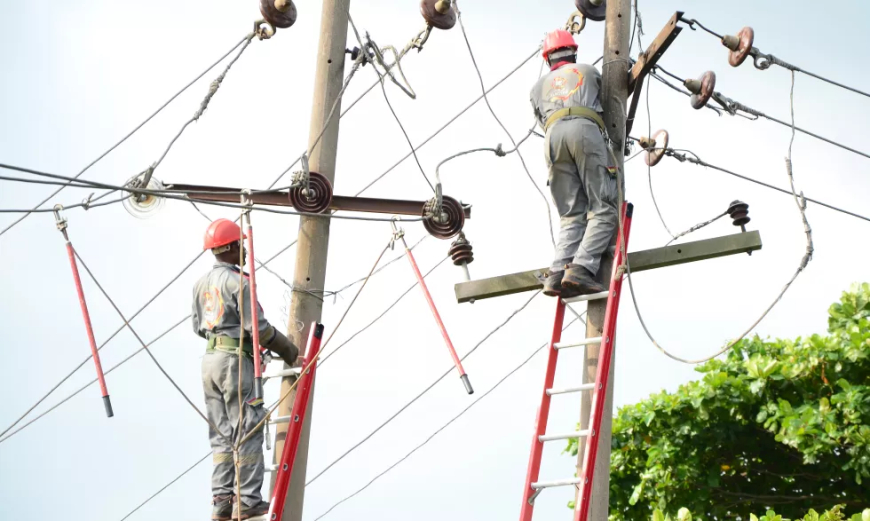FG’s electricity debt balloons by N800bn – Senate

The Senate Committee on Power has raised concerns over the liquidity crisis bedeviling the power sector, lamenting that the tariff shortfalls in the industry have indicated that the government owes about N200bn to electricity generating companies every month.
The committee disclosed that since this year, the government has not paid the power producers, and that this has raised the debt to about N800bn.
The Chairman of the Committee, Senator Enyinnaya Abaribe, disclosed this while fielding questions from journalists during a retreat held in Ikot-Ekpene, Akwa Ibom State, on Saturday.
The retreat, organised by the Nigerian Electricity and Regulatory Commission, was to proffer solutions to critical and emerging issues in the Nigerian Power sector.
The Senate Committee on Power has raised concerns over the liquidity crisis bedeviling the power sector, lamenting that the tariff shortfalls in the industry have indicated that the government owes about N200bn to electricity generating companies every month.
The committee disclosed that since this year, the government has not paid the power producers, and that this has raised the debt to about N800bn.
The Chairman of the Committee, Senator Enyinnaya Abaribe, disclosed this while fielding questions from journalists during a retreat held in Ikot-Ekpene, Akwa Ibom State, on Saturday.
The retreat, organised by the Nigerian Electricity and Regulatory Commission, was to proffer solutions to critical and emerging issues in the Nigerian Power sector.
Abaribe expressed worries that the government has yet to make any payment to the power firms this year, indicating that the country is already indebted by N800bn, in addition to previous indebtedness amounting to over N3tn
“I will not be able to just, in this short interview, give you the statistics of these things. But there’s one key statistic that is very, very necessary for Nigerians to know. There’s a liquidity crisis in the power sector. The generating companies are owed so much, the distribution companies are also owed so much.
“The tariff shortfall that we have means that every month the government owes N200bn of payments, and for this year, 2025, no payment has been made. In other words, we’re already short by N800bn. Before this time, we had about N3tn debt to the generating companies. The generating companies owe the gas suppliers. The gas suppliers cannot just continue to supply gas indefinitely,’’ Abaribe said.
The Senator, however, expressed the hope that there is light at the end of the tunnel.
“The hope is this: a decision must be taken by the Federal Government and the state governments because right now, we have two tiers of electricity markets. The state can do it, the Federal Government can do it, so they must all come together and make that decision.
“How do we get out of this? How do we pay for it? Who pays? And so forth, everywhere else in the world, that decision is always taken. Do we decide to subsidise fuel that we all use to run around, or do we see the decision to subsidise electricity that goes to everyone of us in terms of production. So that’s our choice to make,” he stated.
The Minister of Power, Adebayo Adelabu, while giving an overview of the power sector reforms, highlighted the achievements of the President Bola Tinubu-led administration, especially in the area of an increase in power generation.
He also listed the challenges of the sector to include funding paucity and vandalism of energy equipment, among others, saying “only in this country are energy equipment being vandalised in such magnitude.”
The Governor of Akwa Ibom State, Umo Eno, who was represented by his Deputy, Senator Akon Eyakenyi, described Small and Medium Enterprises as the engine of economic growth in most societies, noting that only a steady electricity supply could unlock the sector.
He expressed hope that with the calibre of resource persons at the retreat, critical issues bedeviling the power sector, would be addressed.
The Depot and Petroleum Products Marketers Association of Nigeria has said that its members can only buy Premium Motor Spirit (petrol) from the Dangote Petroleum Refinery, as the refineries owned by the Nigerian National Petroleum Company Limited cannot optimally produce premium motor spirit but naphtha.
DAPPMAN’s Executive Secretary, Olufemi Adewole, confirmed this in a chat with our correspondent on Sunday. According to him, DAPPMAN members are ready to lift petroleum products from the Dangote refinery as the only viable petrol-producing facility in the country.
Consequently, he stressed that the marketers will only resort to importation if they cannot get the product locally. He highlighted that the Dangote refinery was not ready to sell premium motor spirit to its members who wanted to buy in bulk.
Adewole clarified that his members will not go to the Port Harcourt or Warri refineries for petrol because the facilities are producing naphtha, not optimally producing the much-needed petrol.
“The NNPC refineries, both the revamped Port Harcourt and Warri, are not yet optimally producing PMS; they are producing naphtha.
Our members will not go to them for now.
“But where we can get the product is Dangote refinery and we are willing to work with Dangote refinery, we are willing to buy from Dangote refinery, but if we don’t get the product from Dangote refinery, the PIA allows us to import which is what we’ll go for,” Adewole said.

 admin
admin 


